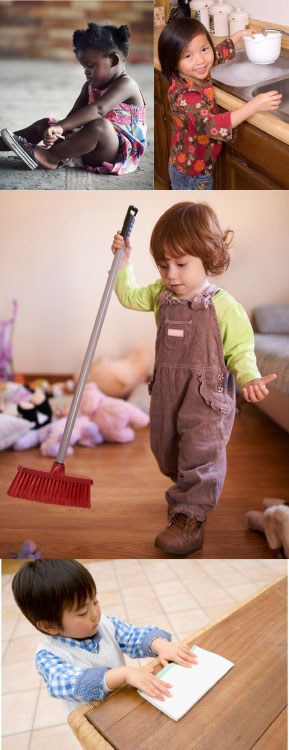Do you the children in your care help you with daily chores? Although it may be easier to do the job yourself, children learn from doing real work. Organization and cleaning are basic skills all people need for their whole lives. Also, doing chores helps children feel useful.

Take time for training
As young children learn a new job, they need step-by-step instructions and time to practice, practice, practice! Children may need to be reminded often, and their work won't be perfect!
Child-size brooms, dustpans, small rags and sponges make it easier for children to help with cleaning chores.
The right tools
Sweeping is fun, but it's a hard job when the broom is twice your size. Find some child-size brooms, small dustpans and brushes, a spray bottle of water, and small cleaning rags and sponges to bring the job down to their size.
Keep children safe
Children should never do jobs that involve hot water, heavy equipment, harmful chemicals, or animal or human waste. Watch children closely if they are helping you in the kitchen.
Make chores fun
- You are a role model for the children. If you complain about chores, children will complain about them too.
- Think of ways to make chores fun for children. You could say, "Let's pretend we are dump trucks as we pick up the blocks. I'll load the blocks into your arms, you drive yourself over and dump them in the bin."
- Let children know you're pleased with their work. "Thanks for singing to the baby while I finished making lunch. That was a big help to me."
- Help children see the end coming. "When we get all the toys put away, we'll go outside to play."
Self care jobs
Learning to brush your teeth, comb your hair, wash your hands and face, and get dressed are lifetime skills that everyone needs. Young children can start learning to do these tasks for themselves.
Some self care jobs are more difficult than others, such as putting on shoes and tying them, zipping zippers, and buttoning buttons. If you have older children who know how to do these tasks, ask them to help the younger children.
Cleaning and clean-up
Don't fret over spilled milk. Hand the child a cloth or some paper towels and let him clean up the mess.
Store paper towels, child-sized brooms, and dustpans where children can reach them. When there's a spill or mess, children can get the cleaning supplies themselves.
Don't have time to dust? Get out some clean old socks and put them on children's hands. They'll have a great time dusting your furniture.
When the toys need to be washed, put an old plastic tablecloth or shower curtain on the floor. Give children a few dishpans of warm water with a little dish detergent in it, washcloths, and a pile of toys. As always, when children are around water, you should be in arm's distance. Children can drown in only an inch or two of water.
Children learn from doing real work.
Sorting
Sorting is a beginning math skill. Have children sort and fold washcloths, sort pairs of socks, and sort toys into different bins.
Kitchen jobs
There are always jobs to be done in the kitchen. Children love to help prepare food. Make sure everyone has clean hands, then put them to work on some of these jobs:
- scrubbing fruits and vegetables
- tearing lettuce and salad greens
- breaking fresh beans
- pouring ingredients into a batter
- mixing batter
- shaking a drink or instant pudding
- cracking and peeling hard cooked eggs
- beating with a hand beater
Don't forget:
- wiping the table
- setting the table (this helps children learn another math skill -- one-to-one)
- clearing the table
- helping to load the dishwasher
Think about other ways you can use helping hands around the house.

